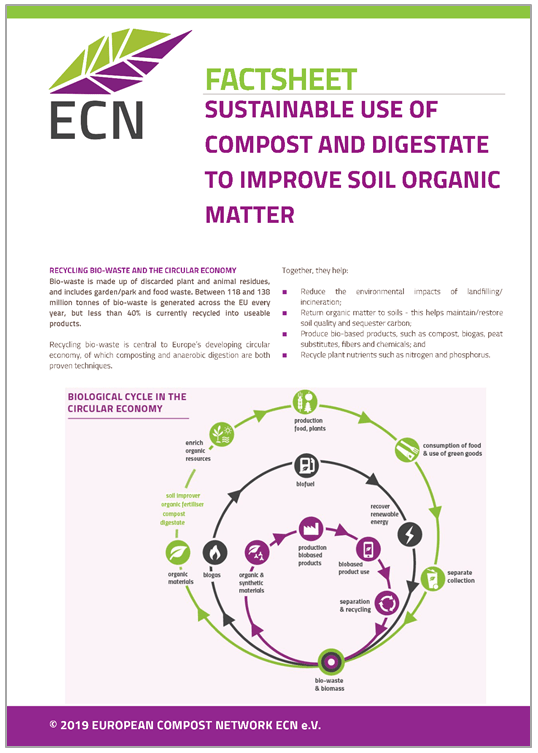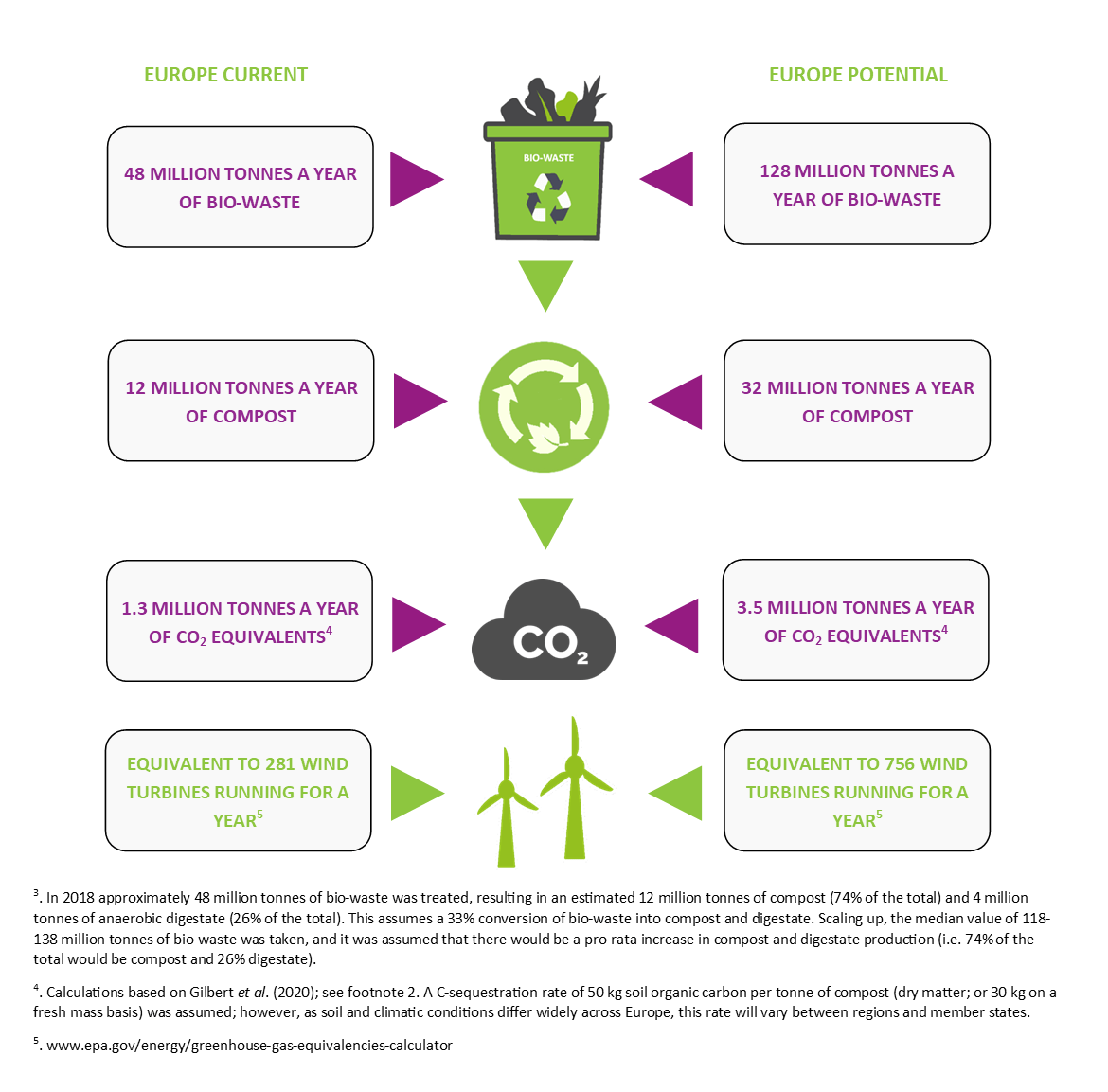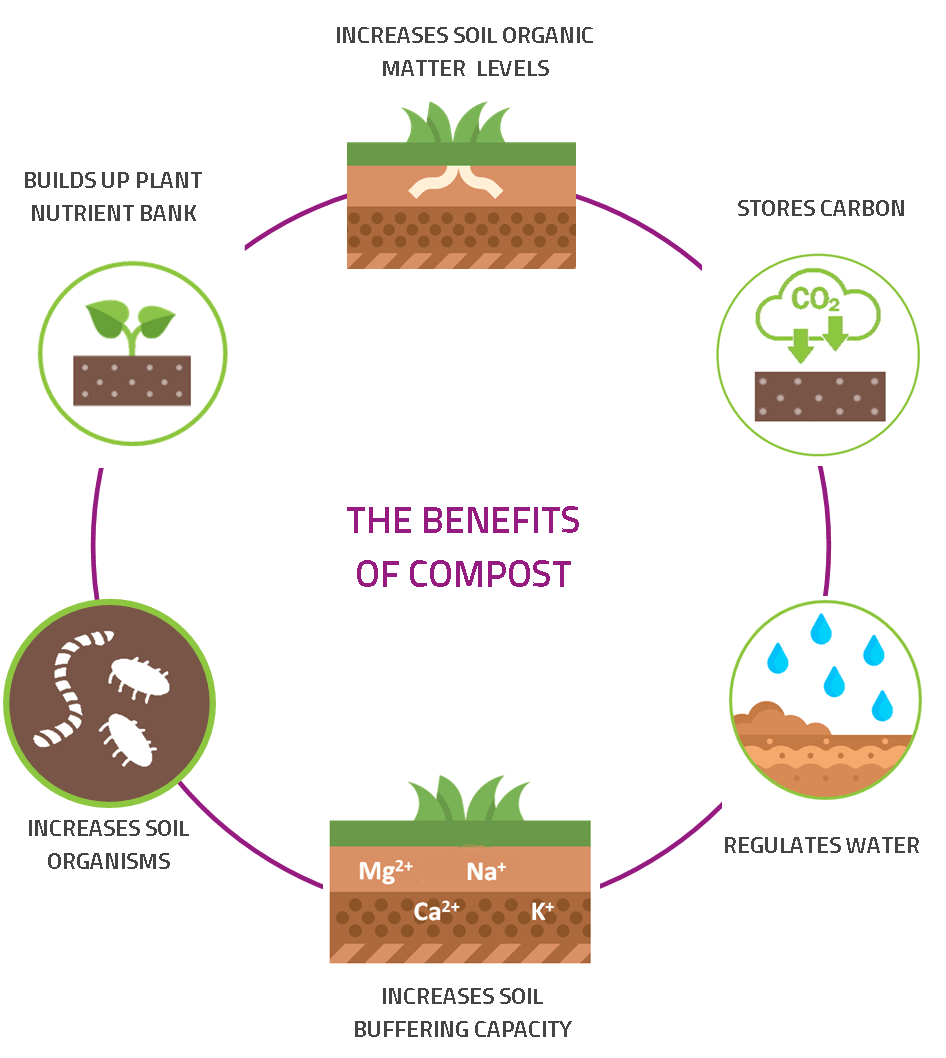 Organic matter in European soils is decreasing. This negatively affects soil productivity. Organic matter contents can be raised by adding organic soil improvers or organic fertilisers.
Organic matter in European soils is decreasing. This negatively affects soil productivity. Organic matter contents can be raised by adding organic soil improvers or organic fertilisers.
Recycling bio-waste into compost and anaerobic digestate harnesses natural biological cycles, converting leftover plant and animal residues into useful products that can be returned to the soil.
Compost is the end product of the composting process and is a valuable soil improver as it contains stable organic carbon that can help (maintain and/or) increase the content of soil organic matter. It also contains a diverse range of micro-organisms that form an essential part of a healthy soil ecosystem.
Digestate is the end product of the anaerobic digestion process and is a valuable biofertiliser as it contains, besides organic matter, useful quantities of plant nutrients that can help farmers reduce artificial fertiliser use.
The ECN Fact Sheet ‘Sustainable Use of Compost and Digestate to Improve Soil Organic Matter’ can be accessed here.
It is also available in Polish here.
I. Soil Organic Matter and Agricultural Impact
II. Carbon Storage with Compost
III. Improving Soils with Compost
IV. Soil Carbon Sequestration Potential with Compost
I. Soil Organic Matter and Agricultural Impact
Soil is made up of many different components, but it is the organic matter fraction that is so important. Soil organic matter helps to:
- Provide structure and hold onto water,
- Store plant nutrients,
- Provide a medium and nutrient source for microbes and invertebrates to live, and
- Store carbon.
It is the organic matter content that helps support the productivity of soil and human’s ability to grow food.
Agricultural Impact on Soil Organic Matter
Intensive agricultural practices mean that the organic matter content of most of Europe’s arable soils is decreasing. This has important implications, as these soils:
- Are less productive – that is, they grow fewer crops,
- Hold onto less water – this means that they dry out quicker in the summer months when water is scarce, and are not as good at absorbing water when it does rain, therefore increasing the likelihood of flooding,
- Store less carbon – this is because soil organic matter is mostly carbon, and it can stay in the soil for many decades if not centuries.
Sustainable and productive agriculture is therefore dependent upon both adequate levels of soil organic matter and the supply of plant nutrients.
II. Carbon Storage with Compost
Compost can be considered as a temporary carbon store. The composting process is complex and involves the degradation of plant and animal residues into a stable, sanitised product called compost.
The composting process transforms the woody parts of plants into humus, which forms the main component of the soil organic matter fraction. Providing that the composting process has been carried out effectively, a fraction of the organic carbon in the bio-waste will have been converted into stable humic substances (humus).
Once applied to soil, the organic matter fraction is further transformed by soil microbes into more stable forms, meaning that it stays in the soil for longer. This can then remain there for many decades, if not centuries. A summary of research studies has shown that, on average, 24% of the organic carbon applied to soil as compost remained as soil organic carbon after 8 years.
The Fact Sheet 1 ‘Soil Structure & Carbon Storage’ of the publication series ‘Sustainable Use of Compost’ can be accessed here.
 III. Improving Soils with Compost
III. Improving Soils with Compost
Soils with low levels of organic matter can be improved by regular applications of quality compost. This has many benefits:
- SOIL ORGANIC MATTER - Experiments have shown that a lot of the carbon in compost is stored in soil as organic matter.
- SOIL STRUCTURE – Compost increases soil aggregate stability and soil pores, thereby reducing compaction.
- WATER HOLDING CAPACITY – Compost helps soil to store water, therefore reducing the need for irrigation.
- SOIL BIOLOGY – Compost increases the number and diversity of invertebrates and micro-organisms in soil. This can help plants resist disease.
- SOIL FERTILITY – Compost helps build up a bank of plant nutrients (including nitrogen, phosphorus & potassium).
- CATION EXCHANGE CAPACITY – Compost increases the buffering capacity of soil, helping it to hold onto nutrients for longer.
IV. Soil Carbon Sequestration Potential with Compost
Bio-waste is made up of discarded plant and animal residues, and includes garden/park and food waste. Between 118 and 138 million tonnes of bio-waste is generated across the EU every year, but less than 40% of this is currently recycled into useable products.
About 12 million tonnes of compost is produced annually across the EU, but this could be increased to just over 32 million tonnes a year if all collectable bio-waste was treated. With these 12 million tonnes (32 million tonnes) 1,3 million tonnes (3,5 million tonnes) of CO2-equivalents could be bound.


